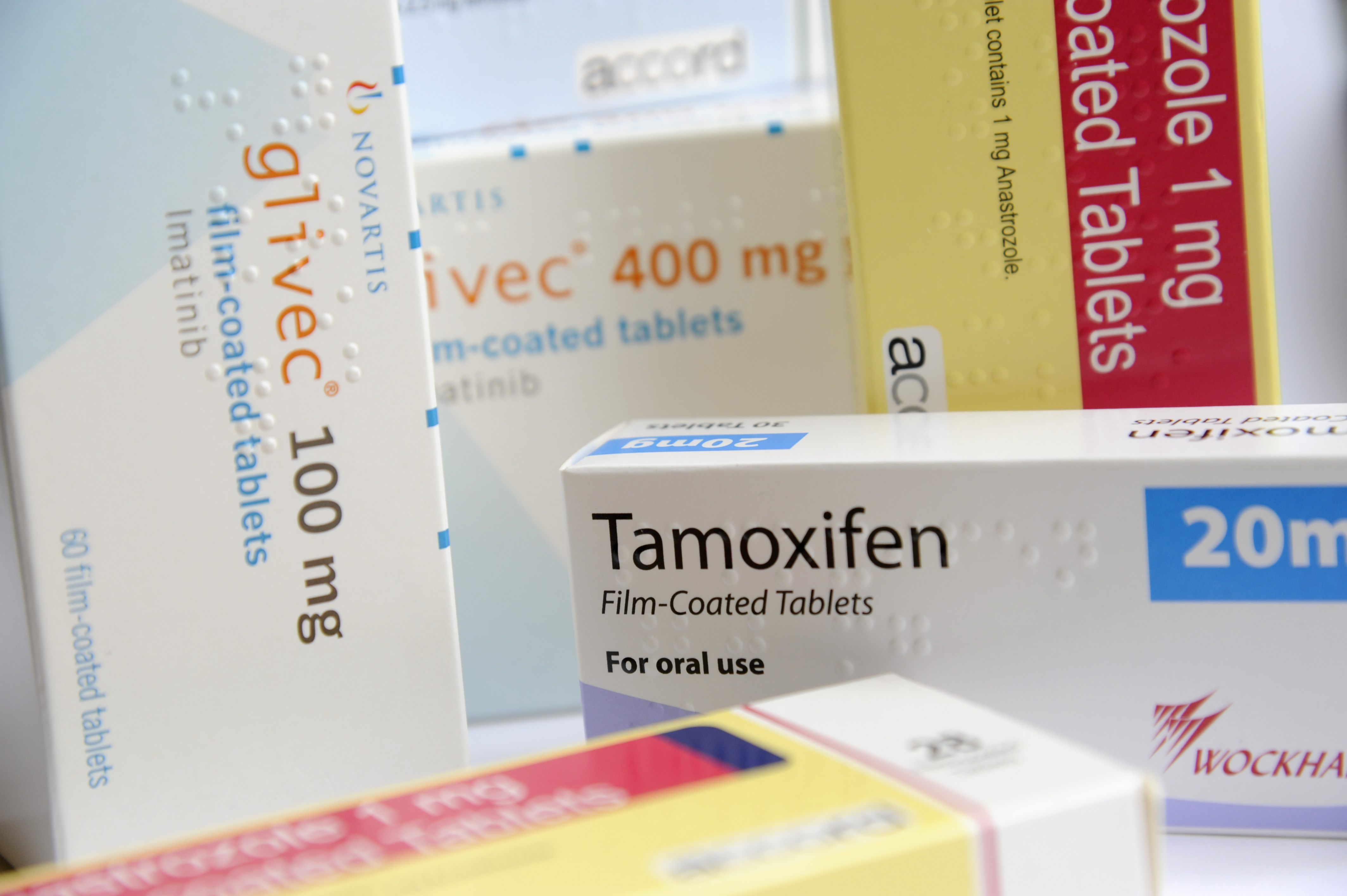
A little more than a decade ago, the prospects for people with chronic myelogenous leukaemia (CML) were rather bleak. Common treatments included high-risk bone marrow transplants, which required at least four weeks in hospital and often led to severe complications down the line. Today, thanks in no small part to the advent of kinase inhibitors, the disease is treated by a few pills with minimal side-effects.
“Kinase inhibitors have truly revolutionised the way we treat CML,” says Dr Faith Davies, who leads the myeloma targeted treatment team at The Institute of Cancer Research, London. “Where past therapies used to require prolonged hospital treatment, many patients using kinase inhibitors now experience nothing worse than a bit of ankle swelling.”
Since the first kinase inhibitor, imatinib, was approved in 2001, long-term survival rates for CML have more than tripled. Over 80% of patients treated with imatinib since 2001 are still alive today. “Their role in CML treatment is undoubtedly a major victory for kinase inhibitors,” says Dr Davies, who is also Consultant Haematologist at The Royal Marsden NHS Foundation Trust.” However, they have value far beyond treating that one disease. Hundreds of kinase inhibitors are being developed all over the world to tackle a vast range of different cancers.”
With such worldwide interest and with 10,000 prescribed in the UK each year, kinase inhibitors are an undoubtedly important class of cancer drug. But what makes them such a hot topic in cancer research?
“Kinases are attractive targets for two key reasons,” explains Dr Michelle Garrett, Reader in Cancer Therapeutics at The Institute of Cancer Research (ICR). “They are one of the first targets to mutate in cancer, and they are druggable.”
A kinase is an enzyme which can change the activity of a protein by adding a chemical known as phosphate to it. This ‘phosphorylation’ can be used for signalling between and within cells. For phosphorylation to take place, a protein kinase must bind with ATP in order to transfer chemical energy. Inhibitors bind to the ATP sites of kinases to block them up, preventing phosphorylation.
This may sound like an ideal solution, but unfortunately many kinases become resistant to inhibitors within about a year. Resistance is often caused by so-called gatekeeper mutations in the kinase which prevent inhibitors from binding. Other resistance mutations include ‘signalling redundancy’ where kinases develop alternative binding sites, allowing them to function when inhibitors block the primary sites. So what can researchers do to tackle the problem of resistance?
“In the lab, we do pre-emptive work to generate resistant strains before drugs are trialled in the clinic,” says Dr Garrett. “We try to work out the best combinations and strategies to overcome or mitigate resistance before treatments are tried on patients. When it comes to trial, we genetically sequence each patient’s tumour to look for mutations associated with resistance. Even at phase I, patients are matched to the best therapies based on the genetic profiles of their tumours.”
Tumour profiling is a vital stage of the modern process for drug discovery and development, as it enables researchers to identify key targets in different cancers. The ICR has an incredibly strong track record in identifying drug targets in this way, and is currently developing a number of kinase inhibitors.
“We are ideally placed for drug discovery here at the ICR,’ explains Dr Garrett, “Our relationship with The Royal Marsden means that researchers doing preclinical work can always talk to the doctors in the clinic to help guide our research. It also allows us to access tumour samples and patients for trials, which is something the pharmaceutical companies simply can’t do.”
Clinical trials are currently ongoing with a kinase inhibitor known as GDC-0941, which was designed in the Cancer Research UK Cancer Therapeutics Unit at the ICR in collaboration with the biotech company Piramed. This drug targets a class of kinases called PI3K, which are implicated in cancer growth, spread and drug resistance. GDC-0941 has shown extremely promising results in the lab and was licensed to the major pharmaceutical company Genentech, a member of the Roche group. The drug is currently being evaluated in cancer patients as a single agent and in combination with other treatments.
Single-kinase inhibitors are ideal for certain cancers, but their effectiveness can be limited to small patient groups and resistance may develop rapidly. A new drug which inhibits multiple kinase pathways is currently undergoing its first ever clinical trial in humans at the ICR. The drug, AT13148, is being tested across solid tumour types including breast and prostate cancer. It is hoped that the drug will destroy tumours and be less prone to resistance than single-kinase inhibitors.
There are many kinase proteins implicated in different cancers, including ‘checkpoint kinases’ which regulate cell multiplication and activate DNA repair mechanisms. ‘By targeting checkpoint kinases, we can increase the effectiveness of chemotherapy and radiotherapy by preventing damaged cancer cells from repairing,’ explains Dr Garrett. Her team discovered the checkpoint kinase inhibitor CCT244747 in 2012, and is currently developing an improved compound.
Researchers are constantly working to improve the effectiveness of treatments, and an ICR team recently revealed some exciting new properties of kinase inhibitors. They found that high doses of the drugs could actually destroy kinases altogether by attacking the systems which keep them structurally stable, and plan to test the mechanism in future clinical trials.
With an impressive track record and plenty of interest worldwide, what might the future hold for kinase inhibitors?
“Over the next decade, I expect combination therapies will be the next big thing,” says Dr Garrett. “We’re already starting to see treatments which drug multiple signalling pathways, and these may prove vital in overcoming resistance and ultimately killing cancer cells.”
